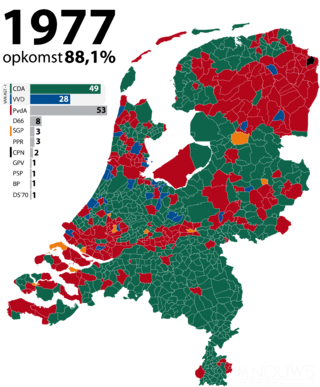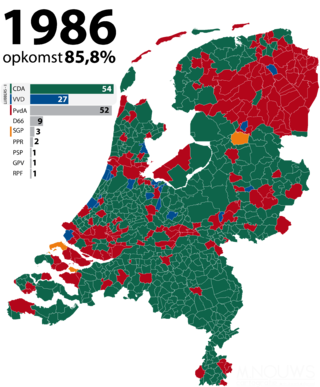The Labour Party is a social democratic political party in the Netherlands.

The Netherlands is a parliamentary representative democracy. A constitutional monarchy, the country is organised as a decentralised unitary state. The Netherlands can be described as a consociational state. Dutch politics and governance are characterised by a common striving for broad consensus on important issues, within both of the political community and society as a whole.

The Christian Democratic Appeal is a Christian democratic and conservative political party in the Netherlands.

General elections were held in the Netherlands on 15 May 2002. The elections were amongst the most dramatic in Dutch history, not just in terms of the electoral results, as they were completely overshadowed by the assassination of leader Pim Fortuyn only nine days before election day.

General elections were held in the Netherlands on 22 January 2003.

The Catholic People's Party was a Catholic Christian democratic political party in the Netherlands. The party was founded in 1945 as a continuation of the interwar Roman Catholic State Party, which was in turn a successor of the General League of Roman Catholic Electoral Associations. The party was in government throughout its existence. In 1977, a federation of parties including the Catholic People's Party, the Anti-Revolutionary Party (ARP) and the Christian Historical Union (CHU) ran together under the Christian Democratic Appeal (CDA) banner. The three participating parties formally dissolved to form the CDA in 1980.

General elections were held in the Netherlands on 28 April 1971. The Labour Party (PvdA) emerged as the largest party, winning 39 of the 150 seats in the House of Representatives. The elections were the first without compulsory voting, causing a sharp fall in voter turnout, down to 79% from 95% in the 1967 elections. Barend Biesheuvel of the Anti-Revolutionary Party (ARP) became prime minister, leading the first Biesheuvel cabinet.

General elections were held in the Netherlands on 25 May 1977. The Labour Party remained the largest party, winning 53 of the 150 seats in the House of Representatives. Following the election, it took 208 days of negotiations to form a new government. This was a European record for longest government formation that stood until after the 2010 Belgian general election. The Christian Democratic Appeal was formed by the Anti-Revolutionary Party (ARP), Christian Historical Union (CHU) and the Catholic People's Party (KVP) in 1976. The first joint party leader was a member of the KVP, Dries van Agt.

Early general elections were held in the Netherlands on 8 September 1982. The Labour Party emerged as the largest party, winning 47 of the 150 seats in the House of Representatives; however, this would be the last time it did so until 1994.

General elections were held in the Netherlands on 21 May 1986. The Christian Democratic Appeal (CDA) emerged as the largest party, winning 54 of the 150 seats in the House of Representatives.

General elections were held in the Netherlands on 6 September 1989. The Christian Democratic Appeal (CDA) remained the largest party, winning 54 of the 150 seats in the House of Representatives. This chamber served for 4 years and 7 months, the longest tenure of any modern Dutch parliament.

General elections were held in the Netherlands on 3 May 1994. The Labour Party emerged as the largest party, winning 37 of the 150 seats in the House of Representatives. The election resulted in significant losses for both the Labour Party and the Christian Democratic Appeal. The two liberal parties, People's Party for Freedom and Democracy and Democrats 66 made large gains, whilst two pro-elderly parties and the Socialist Party all passed the electoral threshold to win seats.

General elections were held in the Netherlands on 6 May 1998. The elections saw the purple coalition of social democrats and liberals strengthen its majority. Both the social democratic Labour Party (PvdA) and the conservative liberal People's Party for Freedom and Democracy (VVD) won considerably, much at the cost of their junior coalition partner, the social liberal Democrats 66 (D66).

The Christian Historical Union was a Protestant Christian democratic political party in the Netherlands. The CHU is one of the predecessors of the Christian Democratic Appeal (CDA), into which it merged in September 1980.

General elections were held in the Netherlands on 22 November 2006, following the fall of the Second Balkenende cabinet. The election proved relatively successful for the governing Christian Democratic Appeal (CDA) which remained the largest party with 41 seats, a loss of only three seats. The largest increase in seats was for the Socialist Party (SP), which went from nine to 25 seats. The main opposition party, the social democratic Labour Party (PvdA) lost nine of its 42 seats, while the right-liberal People's Party for Freedom and Democracy (VVD) and the progressive liberal Democrats 66 lost a considerable portion of their seats, six of 28 and three of six, respectively. New parties, such as the right-wing Party for Freedom (PVV) of former VVD MP Geert Wilders and the animal rights party Party for the Animals (PvdD) were also successful, with the PVV winning nine seats and the PvdD winning two, thereby becoming the first animal rights group to enter a European parliament.

The second Van Agt cabinet was the executive branch of the Dutch Government from 11 September 1981 until 29 May 1982. The cabinet was formed by the christian-democratic Christian Democratic Appeal (CDA), the social-democratic Labour Party (PvdA) and the social-liberal Democrats 66 (D'66) after the election of 1981. The cabinet was a Centre-left grand coalition and had a substantial majority in the House of Representatives with Christian-Democratic Leader Dries van Agt serving as Prime Minister. Former Labour Prime Minister Joop den Uyl the Labour Leader served as Deputy Prime Minister, Minister of Social Affairs and Employment and was given the portfolio of Netherlands Antilles Affairs, Progressive-Liberal Leader Jan Terlouw served as Deputy Prime Minister and Minister of Economic Affairs.

Municipal elections were held in the Netherlands on 7 March 2006. About 11.8 million people could vote in 419 municipalities. Due to municipal reorganisations, 15 municipalities held elections in January 2006 and 24 municipalities held elections in November 2006. In some cities, such as Amsterdam, there were two elections, for the municipality and for the borough councils.

The fourth Balkenende cabinet was the executive branch of the Government of the Netherlands from 22 February 2007 until 14 October 2010. The cabinet was formed by the Christian-democratic Christian Democratic Appeal (CDA) and Christian Union (CU) and the social-democratic Labour Party (PvdA) after the election of 2006. The cabinet was a centrist grand coalition and had a slim majority in the House of Representatives with Christian Democratic Leader Jan Peter Balkenende serving as prime minister. Labour Leader Wouter Bos served as Deputy Prime Minister and Minister of Finance while Social Christian Leader André Rouvoet served as Deputy Prime Minister and Minister without Portfolio for Health, Welfare and Sport.
Roman/Red is the nickname for a period in Dutch politics between approximately 1945 and 1958. This period was characterized by coalitions between the Catholic and social-democratic parties in the Netherlands and Belgium. "Roman" refers to the parties with Roman Catholic affiliation, and "red" refers to the colour associated with social democrats. During the Roman/Red period, the Catholic People's Party (KVP) and the social-democratic Labour Party (PvdA) formed the core of several 'Roman/Red' cabinets, led primarily by Willem Drees.

General elections were held in the Netherlands on Wednesday 9 June 2010. This was triggered by the fall of Prime Minister Jan Peter Balkenende's fourth cabinet on 20 February with Queen Beatrix accepting the resignation of the Labour Party (PvdA) ministers on 23 February. The conservative-liberal People's Party for Freedom and Democracy (VVD), led by Mark Rutte, won the largest number of seats in the House of Representatives while the social-democratic PvdA, led by Job Cohen, came a narrow second. The election was also noted for the rise of the Party for Freedom (PVV), which came third, led by controversial politician Geert Wilders. On the other hand, Balkenende's Christian Democratic Appeal (CDA) saw a poor result, losing half its seats and dropping from first to fourth place. The Socialist Party (SP) also lost seats. Notably, the 31 seats won by the VVD was its most since 1998, and the one-seat margin between the VVD and PvdA is the closest on record.


















